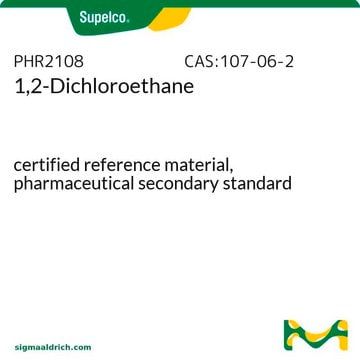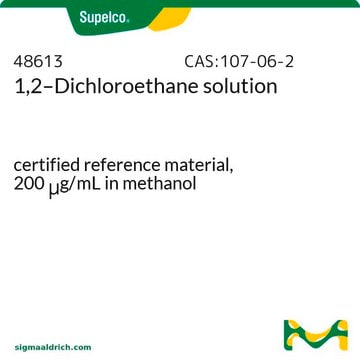02562
1,2-Dichloroethane
analytical standard
Synonym(s):
Ethylene chloride, Ethylene dichloride
About This Item
Recommended Products
grade
analytical standard
Quality Level
vapor density
3.4 (20 °C, vs air)
vapor pressure
87 mmHg ( 25 °C)
Assay
≥99.9% (GC)
autoignition temp.
775 °F
shelf life
limited shelf life, expiry date on the label
expl. lim.
15.6 %
technique(s)
HPLC: suitable
gas chromatography (GC): suitable
refractive index
n20/D 1.444 (lit.)
n20/D 1.444
bp
83 °C (lit.)
mp
−35 °C (lit.)
density
1.256 g/mL at 25 °C (lit.)
application(s)
agriculture
cleaning products
cosmetics
environmental
food and beverages
personal care
format
neat
SMILES string
ClCCCl
InChI
1S/C2H4Cl2/c3-1-2-4/h1-2H2
InChI key
WSLDOOZREJYCGB-UHFFFAOYSA-N
Looking for similar products? Visit Product Comparison Guide
General description
Application
Recommended products
Signal Word
Danger
Hazard Statements
Precautionary Statements
Hazard Classifications
Acute Tox. 3 Inhalation - Acute Tox. 4 Oral - Asp. Tox. 1 - Carc. 1B - Eye Irrit. 2 - Flam. Liq. 2 - Skin Irrit. 2 - STOT SE 3
Target Organs
Respiratory system
Storage Class Code
3 - Flammable liquids
WGK
WGK 3
Flash Point(F)
55.4 °F - closed cup
Flash Point(C)
13 °C - closed cup
Personal Protective Equipment
Choose from one of the most recent versions:
Already Own This Product?
Find documentation for the products that you have recently purchased in the Document Library.
Our team of scientists has experience in all areas of research including Life Science, Material Science, Chemical Synthesis, Chromatography, Analytical and many others.
Contact Technical Service









